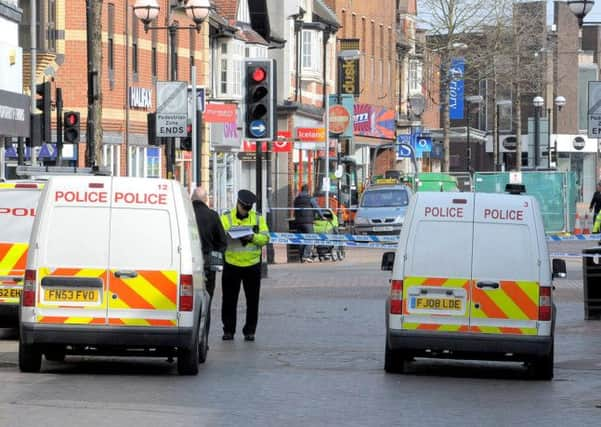East Midlands: Police forces agree to form specialist regional service


Police and Crime Commissioners and chief constables from Leicestershire, Lincolnshire, Northamptonshire and Nottinghamshire have approved a region-wide Operational Support (OS) service which will significantly increase the number of officers each force can call upon for specialist assistance as and when required.
The forces, which already collaborate in many areas of policing, including the investigation of serious and organised crime and homicides, have selected a Senior Management Team (SMT) of officers from participating forces to lead the service when it goes live on 31st March.
Advertisement
Hide AdAdvertisement
Hide AdPaddy Tipping, Notts Police and Crime Commissioner, said: “This is a big step forward for the East Midlands collaboration programme and is an essential weapon in the fight to protect our frontline services. It will help us streamline the way we work, remove unnecessary duplication and place us all in a better financial position.”
“This latest programme for joint work with our neighbouring forces builds on the established, and highly effective, collaborative venture already in place in the region, further reducing costs and increasing resilience for the taxpayer.”
Lincolnshire chief constable Neil Rhodes added: “The first point to make is that the public will not notice any discernable difference in the service they receive from their police force.”
“Our local response teams will always be first on the scene of an incident or crime.”
Advertisement
Hide AdAdvertisement
Hide Ad“What we are doing is creating a greater pool of expertise and specialist skills for each of our forces to call upon when dealing with crime in our communities.”
“While each of our individual forces has its own issues and areas of risk that we need to find local solutions to, it does not mean we have to address those issues in isolation and that is very largely what police collaboration is about.”
“We have historically invoked mutual aid agreements to call on support from neighbouring forces when required, but this single regional structure will give us substantially more flexibility and resources than the old arrangements.”
“A single command structure will mean that we have a clear view of policing needs and priorities right across the region, rather than four different assessments that only extend as far as our respective county borders.”
Advertisement
Hide AdAdvertisement
Hide Ad“There will be some financial savings for the forces too, realised largely by having the streamlined command structure. Reducing the number of senior managers in OS will mean we have their policing experience and knowledge at our disposal to help bolster and sustain local policing.”
The new scheme means the forces have now set out the underlying principles for the collaboration which will include working together as one to provide a more effective service across all four forces, commitment and contribution towards local policing through effective tasking and co-ordination, effective management and collective responsibility, building trust and confidence, balancing benefits with savings, releasing funds where possible, a consultative approach based on openness and transparency, greater efficiency and a consistent approach and a threat and risk-based approach.
Assistant chief constables from each of the four forces will now prepare detailed plans for how the four key areas of operational support policing – command and control, public order, armed policing, strategic roads policing - will be managed.
Mr Rhodes said: “Each of us in the East Midlands forces know we can operate successful collaborations. We have done it time and again in many complex and sensitive areas of police work and the region is acknowledged as the country’s market leader in collaborative policing.”
Advertisement
Hide AdAdvertisement
Hide Ad“What we are introducing here is a structure that will further enhance the service we provide to victims of crime and members of the public in general, irrespective of whether they live in Leicestershire, Lincolnshire, Northamptonshire or Nottinghamshire.”